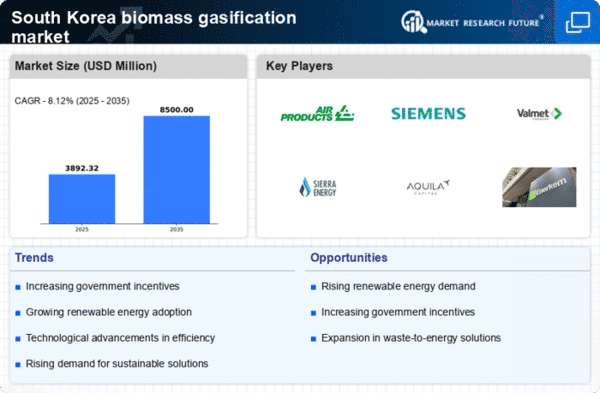Increased Energy Security
The biomass gasification market in South Korea is experiencing a notable surge due to the increasing emphasis on energy security. As the nation seeks to reduce its dependence on imported fossil fuels, biomass gasification presents a viable alternative. The South Korean government has set ambitious targets to enhance energy independence, aiming for a 20% share of renewable energy in the total energy mix by 2030. This shift is likely to drive investments in biomass gasification technologies, as they can convert locally sourced biomass into clean energy. Furthermore, the potential for job creation in rural areas through biomass supply chains adds to the attractiveness of this market. The focus on energy security is expected to bolster the biomass gasification market, making it a critical component of South Korea's energy strategy.
Economic Viability of Biomass Resources
The economic viability of biomass resources is a significant driver for the biomass gasification market in South Korea. With the increasing costs of fossil fuels, biomass is becoming a more attractive option for energy production. The South Korean government has implemented various incentives to promote the use of biomass, including subsidies and tax breaks for biomass gasification projects. According to recent data, the cost of biomass feedstock has decreased by approximately 15% over the past five years, making it a more competitive energy source. This trend is likely to encourage more businesses to invest in biomass gasification technologies, thereby expanding the market. The economic benefits associated with utilizing local biomass resources not only support energy production but also contribute to rural development, enhancing the overall appeal of the biomass gasification market.
Public and Private Sector Collaboration
Collaboration between the public and private sectors is emerging as a vital driver for the biomass gasification market in South Korea. The government is actively engaging with private companies to foster innovation and investment in biomass technologies. Public-private partnerships (PPPs) are being established to facilitate research, development, and deployment of biomass gasification projects. This collaborative approach is likely to enhance the efficiency and effectiveness of biomass gasification initiatives, as resources and expertise are shared. Furthermore, the South Korean government has allocated approximately $200 million for biomass energy projects over the next five years, indicating a strong commitment to advancing this sector. Such collaboration is expected to accelerate the growth of the biomass gasification market, making it a key player in the transition to a sustainable energy future.
Regulatory Framework Supporting Renewable Energy
The regulatory framework in South Korea is increasingly supportive of renewable energy initiatives, which is a crucial driver for the biomass gasification market. The government has established various policies aimed at promoting renewable energy sources, including biomass. For example, the Renewable Portfolio Standard (RPS) mandates that energy suppliers meet a certain percentage of their energy production from renewable sources, which includes biomass. This regulatory environment is likely to stimulate investments in biomass gasification technologies, as companies seek to comply with these mandates. Additionally, the government has set a target to increase the share of renewable energy to 30% by 2030, further emphasizing the importance of biomass gasification in achieving these goals. The supportive regulatory framework is expected to enhance the growth prospects of the biomass gasification market.
Technological Innovations in Gasification Processes
Technological innovations are playing a pivotal role in shaping the biomass gasification market in South Korea. Recent advancements in gasification technologies, such as improved reactor designs and enhanced feedstock processing methods, are increasing the efficiency and output of biomass gasification systems. For instance, the introduction of integrated gasification combined cycle (IGCC) systems has shown to improve energy conversion efficiencies by up to 30%. These innovations not only reduce operational costs but also enhance the environmental performance of biomass gasification plants. As South Korea continues to invest in research and development, the market is likely to witness further technological breakthroughs that could lead to more sustainable and economically viable biomass gasification solutions. This ongoing evolution in technology is expected to attract more stakeholders to the biomass gasification market.
















